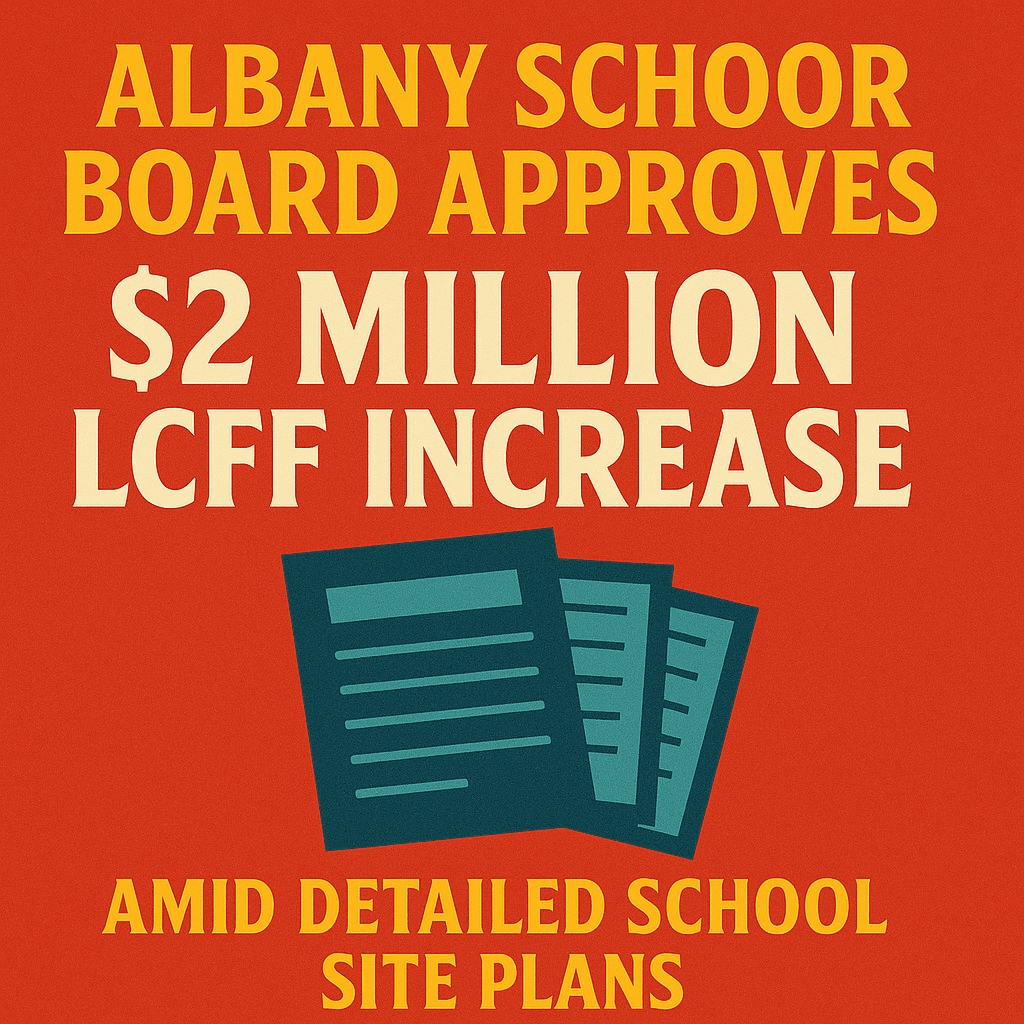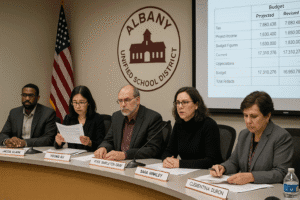Albany School Board Approves $2 Million LCFF Increase Amid Detailed School Site Plans


In a decisive meeting on June 17, 2025, the Albany Unified School District Board of Education approved the district’s 2025-26 budget, reviewed comprehensive school improvement plans, and adopted new course materials while celebrating strong academic performance across the district.
Budget Reveals Mixed Financial Picture
The newly adopted budget shows a projected increase in unrestricted revenue primarily due to the 2.3% Cost of Living Adjustment (COLA) to the Local Control Funding Formula (LCFF). This adjustment will result in approximately $2 million in additional LCFF revenue compared to the previous fiscal year.
However, despite this revenue boost, the district faces financial headwinds. According to Linda Wu, Chief Business Official for Albany Unified, the district projects deficit spending of approximately $494,000 in unrestricted General Fund dollars by the end of the 2024-25 fiscal year, with an additional projected deficit of $399,000 anticipated for the 2025-26 fiscal year.
“Increasing costs of living and inflation are primary drivers behind the deficit spending projections,” Wu noted during the budget presentation.
School Plans Reveal Academic Progress and Challenges
The board meeting featured detailed presentations from all school principals on their School Plans for Student Achievement (SPSA) for 2025-26, revealing both achievements and areas needing improvement.
Elementary School Performance
The elementary schools reported mixed results in standardized testing:
- Cornell Elementary: While 80% of students continue to meet or exceed grade-level benchmarks, the school saw a slight 2% decline in both English Language Arts and math. More concerning was an 18% decrease in English Learner scores in ELA, though students with disabilities showed a 4% improvement.
- Marin Elementary: Principal Darren Fresquez reported that African-American students increased their math proficiency from 53% to 60%, nearly double the rate from two years ago. The school also saw improvements among socioeconomically disadvantaged students.
- Ocean View Elementary: Principal Katie Breuer highlighted significant improvements in English Learner progress toward proficiency, a factor that contributed to the school’s Distinguished School Award. The school also saw substantial decreases in chronic absenteeism across all student groups.
Middle School Achievements
Albany Middle School Principal Melisa Pfohl emphasized both academic and social-emotional priorities:
“Students cannot be successful academically if they’re struggling with their social emotional and mental health,” Pfohl stated during her presentation. “In middle school, if you remember back to when you were 11 to 14, that is a very big piece of growing up and enjoying school.”
The school reported improved ELPAC scores with 74% of English Learners making progress toward proficiency, though chronic absenteeism remains a concern despite improvements.
High School Excellence
Albany High School Principal Darren McNally reported the school’s best standardized test scores ever, with 84% of students meeting standards in English Language Arts and 70% in mathematics. Particularly notable was the improvement among English Learners, with 71% showing progress—a significant jump from below 50% the previous year.
“The median number of sections for a class at Albany High School is two. We have a very diverse number of courses—more than 100 different courses—to meet lots of different student needs,” McNally explained.
The high school’s dropout rate has fallen below 2%, with only two non-graduates expected from the class of 2025.
New Course Offerings and Arts Funding
The board unanimously approved instructional materials for a new AP African American Studies course at Albany High School. Michelle Laosim, who presented the recommendation, noted that student interest has been overwhelming.
“Since the course has been adopted, we actually have signups for four sections next year, which for a new AP course is a very significant number,” McNally added.
The district also approved its annual report on Proposition 28 arts funding, which has enabled expanded art instruction for grades 1-5, new electives including computer education and robotics at the middle school, and additional dance and orchestra sections at the high school.
Board Self-Evaluation Shows Strengths and Growth Areas
Board President Hopwood presented results from the board’s annual self-evaluation, which identified ethical leadership as a particular strength. Areas for improvement include board training opportunities, policy development, budget education, facilities planning, and legislative advocacy.
“The board environment is described as stable, constructive, and functional,” Hopwood noted, drawing light laughter from fellow board members who jokingly added “surprisingly effective” to the description.
Facilities Planning Moves Forward
The board approved a Request for Qualifications/Proposal (RFQ/P) for Master Planning Services and Process to address facility needs across the district. Linda Wu indicated the goal is to develop “a conducive plan on next steps by October 1st.”
The Citizens’ Bond Oversight Committee also presented its annual report, noting that 99% of Measure B funds ($72 million) and 94% of Measure E funds ($27 million) have been spent, with approximately $1.6 million remaining for planned projects.
Looking Ahead
As the 2024-2025 school year concludes, Superintendent Stone reflected on her first six months leading the district.
“Tonight marks the end of my first six months as superintendent for Albany Unified, and it’s been a very meaningful and energizing start,” Stone said. She highlighted student voices from graduation ceremonies, noting that “our students are modeling what it means to lead with heart, integrity, and courage in this really complex time.”
Board members echoed these sentiments, with Vice President Mahoney noting the positive shift in district momentum: “We’re not reopening schools from COVID, we are not hiring superintendents and CBOs. We can actually focus on what we can do for our students.”
Tom Wong is an independent investigative reporter focused on local government accountability and educational policy. His reporting examines the intersection of public education, fiscal responsibility, and community impact.










